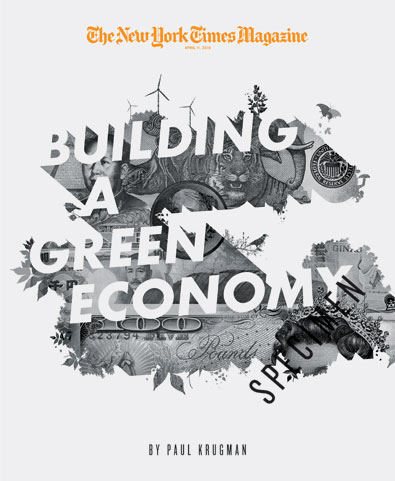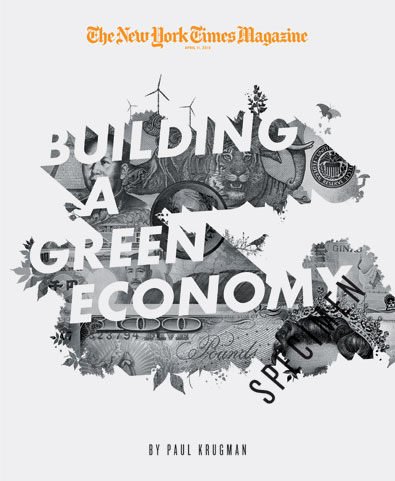 Illustration by Michael Freimuth and Kyle PoffMany people, including me and, um, Al Gore, have recommended Paul Krugman’s primer on climate economics. It’s a top-notch introduction and a welcome antidote to the ignorance and hysteria that characterize most media coverage of climate policy. Read it!
Illustration by Michael Freimuth and Kyle PoffMany people, including me and, um, Al Gore, have recommended Paul Krugman’s primer on climate economics. It’s a top-notch introduction and a welcome antidote to the ignorance and hysteria that characterize most media coverage of climate policy. Read it!
In describing environmental economics, however, Krugman simply passes along many of its flaws. Economist James Barrett identified a few of them. I want to echo and reinforce one of the points he made.
“Not that bad” ain’t good
The great sin of conventional economics is the assumption of rationality. According to rational choice theory, individuals act to maximize their self-interest; ergo, markets based on free exchange of goods and services will yield maximally efficient distribution of resources. A free market is, in German philosopher Gottfried Leibniz’s terms, the best of all possible worlds. Most of what economists miss about energy can be traced to to the lingering effect of this assumption.
Now, every time I bring this up, people come out of the woodwork to tell me I’m constructing a caricature, and everybody knows about market failures. Which is ironic, since the people who bitch about rational choice theory more than anyone I know are economists. (Again: see James Barrett. Or anything Dean Baker‘s ever written. Or the entire field of behavioral economics.) What they tell me is that the most common macroeconomic models still rest on the assumption of rational choice; that the most influential names in the field still work with the assumption; that new approaches are still marginal and viewed with skepticism by modelers; and that laypeople’s understanding of economics is heavily colored by it.
Anyway, the assumptions of rational choice theory are the only way to explain something like this — and that’s one of a dozen articles I could cite. They are the only way to explain the results of the economic models used by the CBO to score climate legislation. They’re the only way to explain the conventional wisdom in D.C. that climate legislation is all about costs. After all, as Barrett says, “with everyone constantly and correctly optimizing their behavior, there is nothing the government can do to make us any better off.”
Lamentably, Krugman’s article reenforces that conventional wisdom. He concludes that pricing carbon is the Ultimate Climate Policy (maaaybe we can tack on a few performance standards for coal plants). According to mainstream economic modeling, a carbon price will inhibit GDP growth. Krugman’s cri de couer is as follows: “Restricting emissions would slow economic growth — but not by much.” Freeeeeedooooom!
“Not as bad as you might have worried” may be a convincing argument to pointy-headed intellectuals, but it hasn’t exactly gotten the public fired up. To boot, it’s almost certainly incorrect. Krugman simply ignores the panoply of policies proven to boost economic productivity and reduce emissions.
They exist! Long ago, in the Dark Ages (1997), over 2,500 economists, including nine Nobel Laureates, endorsed “The Economists’ Statement on Climate Change.” The second of three propositions in that statement was:
2. Economic studies have found that there are many potential policies to reduce greenhouse-gas emissions for which the total benefits outweigh the total costs. For the United States in particular, sound economic analysis shows that there are policy options that would slow climate change without harming American living standards, and these measures may in fact improve U.S. productivity in the longer run. [Emphasis mine.]
One of the original drafters of the statement? A future Laureate and MIT professor by the name of Paul Krugman. If he believes there are policies that reduce emissions and improve productivity — surely good news — why didn’t he discuss them in his piece?
Our fallen world
There are two ways of going after the rational choice assumption.
One is to say that even in ideal market conditions — low barriers to entrance and exit, perfect information, and the rest — human beings are “predictably irrational.” We undervalue gains relative to losses; undervalue future utility relative to present utility; misunderstand large dollar amounts and long time spans. Even in ideal markets, there’s a place for public policy to correct maladaptive features of human cognition. I think that argument — a staple of behavioral economics — is legit, and winnable.
But my objection to Krugman’s take on climate economics is even more basic. To see what I mean, consider this passage:
If there’s a single central insight in economics, it’s this: There are mutual gains from transactions between consenting adults. … Free markets are “efficient” — which, in economics-speak as opposed to plain English, means that nobody can be made better off without making someone else worse off.
…
But what if a deal between consenting adults imposes costs on people who are not part of the exchange? What if you manufacture a widget and I buy it, to our mutual benefit, but the process of producing that widget involves dumping toxic sludge into other people’s drinking water? When there are “negative externalities” — costs that economic actors impose on others without paying a price for their actions — any presumption that the market economy, left to its own devices, will do the right thing goes out the window. So what should we do? Environmental economics is all about answering that question.
Perhaps inadvertently, Krugman reveals how environmental economists seem to think of their work. Assume a free market filled with exchanges among “consenting adults.” Then introduce a negative externality — say, CO2 emissions. What’s the proper response? Viewed in that light, obviously the right response is to put a price on the externality. Done! That’s why the environmental economist’s approach to climate policy always seems to be: price carbon and get out of the way.
But … and this is a gargantuan but (quit snickering) … why would you assume a free market? Are there free markets in energy anywhere in the world? If so I’m not familiar with them. Everyone involved in energy markets is always and already operating within a skein of existing market distortions. We live in a fallen world.
More mechanics, less theory
Start with the fact that U.S. electrical utilities are a nightmare of overlapping regulations and jurisdictions, some deregulated, some semi-regulated, some regulated monopolies. Or start with the fact that the global oil market is dominated by state-owned enterprises. Or start with the fact that governments, particularly militaries, are among the largest purchasers of energy. Right on down the line, you find “free” markets distorted by overlapping local, state, and federal regulations, tax breaks, political favoritism, and public infrastructure choices. Very often existing distortions serve the interests of incumbents. (See, e.g., Matt Yglesias on “Mandatory Sprawl.”)
However people in energy markets may behave inside this web of constraints, distortions, and politicizations, it’s not going to be well-captured by models based on rational choices within perfect markets. Yes, economists can tell us how a free market will react to a cap-and-trade system. But can they tell us how the network of regulated monopoly utilities in the South will respond to it? That’s what I want to know!
What we need from economics is fewer theorists and more mechanics, people who understand how energy markets actually work and can offer informed counsel about how to make them work better. I want economically credible strategies that can help us get from here, our fallen, compromised, dirty world, to there, a freer, more sustainable world.
For instance, I’d love for an economist who understands the U.S. utility market, its structure and political history, to model the benefits of various utility reforms. I’d love for more economists to wake up to the vast, untapped potential for efficiency in commercial and industrial buildings, and model how various policies might realize that potential. More broadly, I’d like more economists to question the imperative for growth and start thinking about different models of prosperity. I’d like more economists to incorporate research on human happiness and welfare, to model changes the aren’t captured by GDP. And so on.
There are economists out there doing all this stuff, but theirs are not the voices that find their way into media and public discussion. Whatever may be going on in academia, in popular culture an extremely crude, reactionary sort of economic folk wisdom continues to dominate. Environmental economists could do more to challenge that folk wisdom, but often they’re too busy trying to prove that they are Very Serious Economists and not DFHs. Me, I’m ready for some hippie economics.


